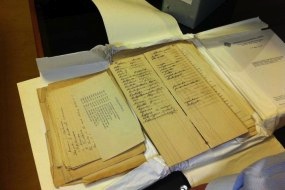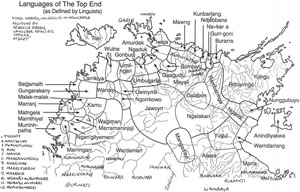Australia is the place of vanishing languages
A dictionary of two central Australian languages was recently discovered at the State Library of New South Wales.
More needs to be done to protect Indigenous languages and the culture and heritage they represent, writes Chris Raja.
Recently, at the State Library of New South Wales, Sydney University's Dr Michael Walsh made a significant discovery. In boxes of unpublished papers he unearthed a 125-page dictionary of two central Australian languages – Arrarnta and Luritja – compiled by German missionary Carl Strehlow.
Walsh has been working with Ronald Briggs, the Indigenous services librarian at the State Library, investigating the languages used among Indigenous Australians.

When I read a news report of Walsh's find, I immediately told my Western Arrarnta friends. No-one in the community was aware of the discovery, but they all were in agreement that these important Western Arrarnta word lists should make their way back to central Australia. At the least, they would like to see the box and its contents.
The find got me thinking about my own culture, language and heritage. I was born in Calcutta and love to hear Bengali spoken. I am proud of filmmakers like Satyajit Ray, who made films in his local vernacular that the entire world grew to love. I appreciate the poetry of Rabindranath Tagore.
Due to various circumstances, I cannot speak or read Bengali and this disconnects me from the place of my birth. I dream I am in the arms of Kali attempting to cut the mother's tongue out. Sure, I still know some Hindi, but that too is being erased from my memory with time and distance.
I wonder what my Australian children will make of my old country? Are we Australian forever now? Or, will they too one day like to learn the language and more of the culture of their father's place of birth? Or will they choose to learn one of the many Indigenous languages that surround them in the Northern Territory?
I know I need to - and long to - celebrate more films, books, articles and plays in a variety of languages. Language defines a group of people. It is the voice of culture and heritage. Nothing is possible without language.
The definition of cultural heritage can vary. It can be physical – such as that contained in culturally-significant buildings, landscapes and artefacts – or intangible, contained in language, music, movies and customs, festivals, and food.
But it's not just old things, pretty things, or physical things. Cultural heritage involves strong human emotions. The role language, culture and heritage plays in a person's life and community cannot be underestimated. Culture is the basis of all social identity and development, and cultural heritage is the legacy that each generation receives and passes on. In a sense, it is what makes us human.
There are other considerations, such as what happens to a culture that is brought so low that its language is taken from it. Once you take away a nation's language, you take away its soul. Once language is lost, people are forced to think and see the world differently. They lose their mother tongue.
In the past, before colonisation, the First Australian languages and dialects were spoken. But later, even well into the 1960s, children were punished for speaking their own languages in schools in various parts of Australia. Former prime minister Gough Whitlam introduced bilingual education in schools in Australia in December 1972. But in 2008, the NT Government announced that school programs were to be taught only in English for the first four hours of every school day. The policy was replaced with a new policy in 2012, which stated that home and local languages "can and should be used where appropriate to support the learning and acquisition of concepts."
The Four Hours In English policy had disastrous consequences. Languages are in threat of dying out. Australia is the place of vanishing languages. The truth is that the West, and in particular the English language, has run over most other languages and cultures like a semitrailer truck. It has been nothing short of devastating.
Recognising, respecting and celebrating languages, diversity and cultural heritage is integral to healthy, harmonious relationships. Cultural heritage is not static. Culture and language changes over time and approaches need to be dynamic and adaptive. Effective cultural heritage management can have wide economic, social and environmental benefits.
So what place is there for Australian Indigenous languages? And should we care for languages that have a thousand or a hundred or so speakers left? Is it a terrible tragedy that most Aboriginal Australian languages are dead and will never be heard again? Is it okay that we are not terribly worried about that? How are we to ensure the vitality and the ongoing viability of the languages we still do have?
We need to create more content in Australian Indigenous languages. Encourage more language centres and active language speakers. Support the right people with administrative and technological help. By doing these things, we will be helping tourism, young rangers, health workers, teachers and students.
Put simply, culture, language and heritage matter. The fact is schools in the Northern Territory where I live have, for the last ten years, overlooked the importance of Australian Indigenous languages and cross-generational learning.
I have witnessed first hand how little importance we have placed on Australian Indigenous languages even though bilingualism is a gift for us as a nation. The same could probably be said for the United States or Canada.
I wonder how many Indigenous language groups are known or could be named by the majority of Australians? I look forward to the day a prime minister of this country can speak one of the many Australian Indigenous languages. Now that would be something.
We need to celebrate the multilingual diversity of Australia, especially amongst its first people. Instead of devaluing the fact that this nation's first people can speak several languages, can we respect two-way learning? Let's cherish the wealth and wonder of people who still know these old, rare languages and stories that we have tried so hard to eradicate.
by Christopher Raja, an Alice Springs-based writer.
First posted November 19, 2013 14:35:04
http://www.abc.net.au/news/2013-11-19/raja-australia-is-the-place-of-vanishing-languages/5101822/?site=indigenous&topic=latest


